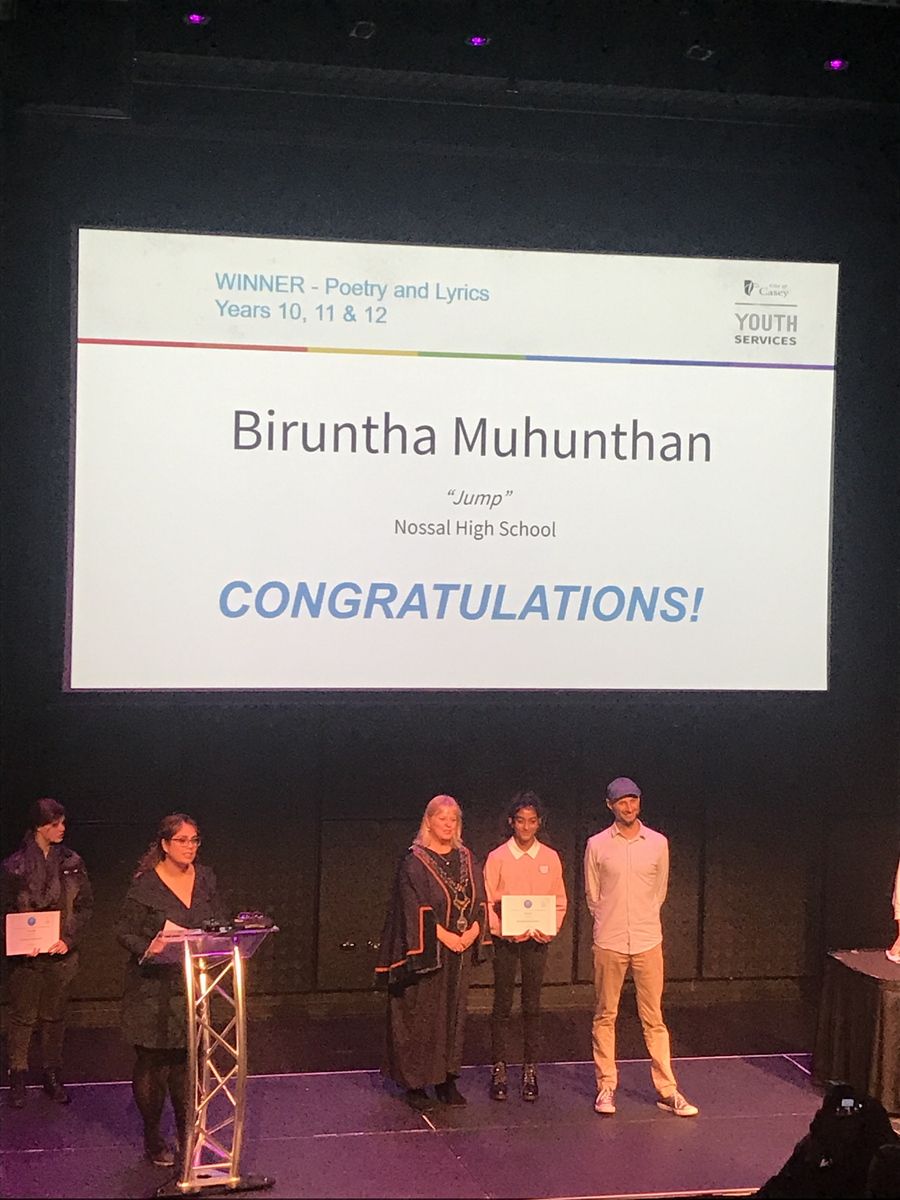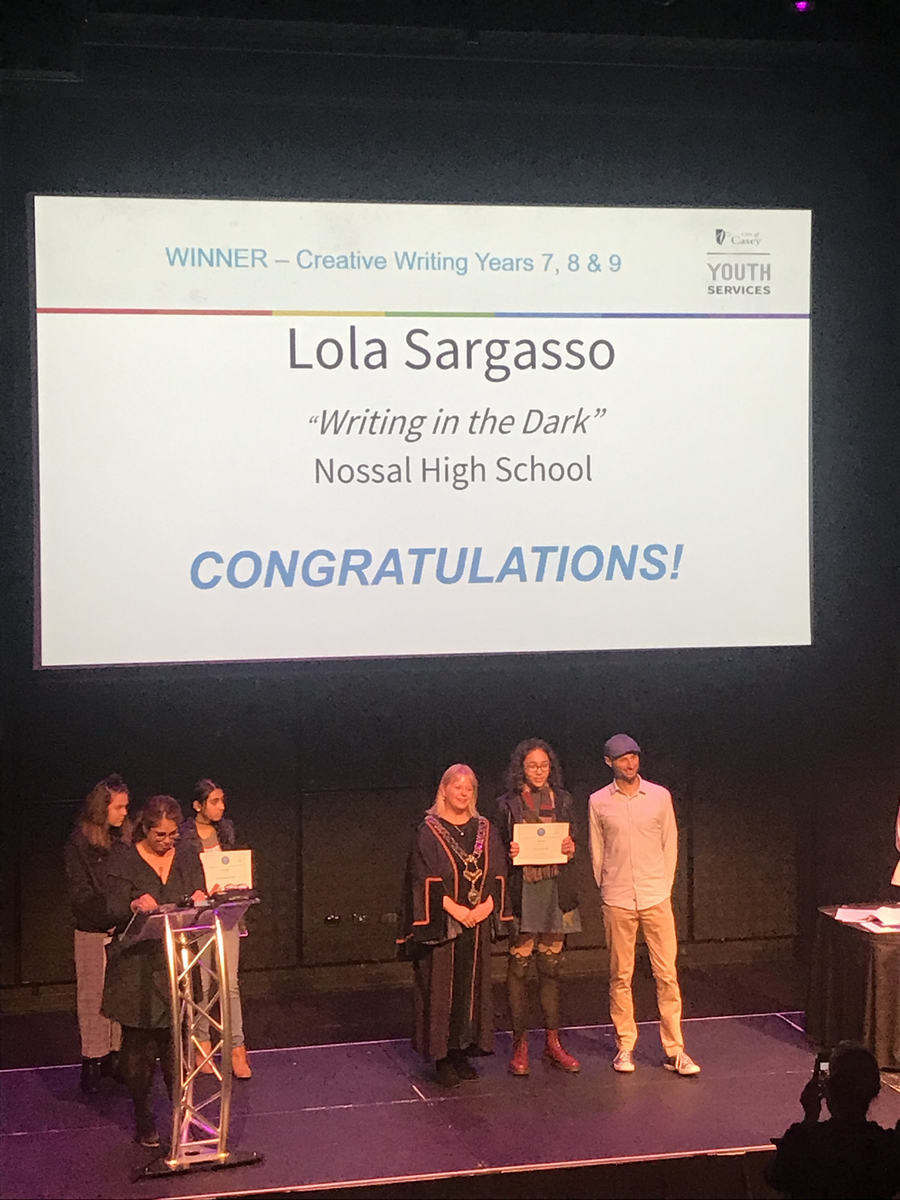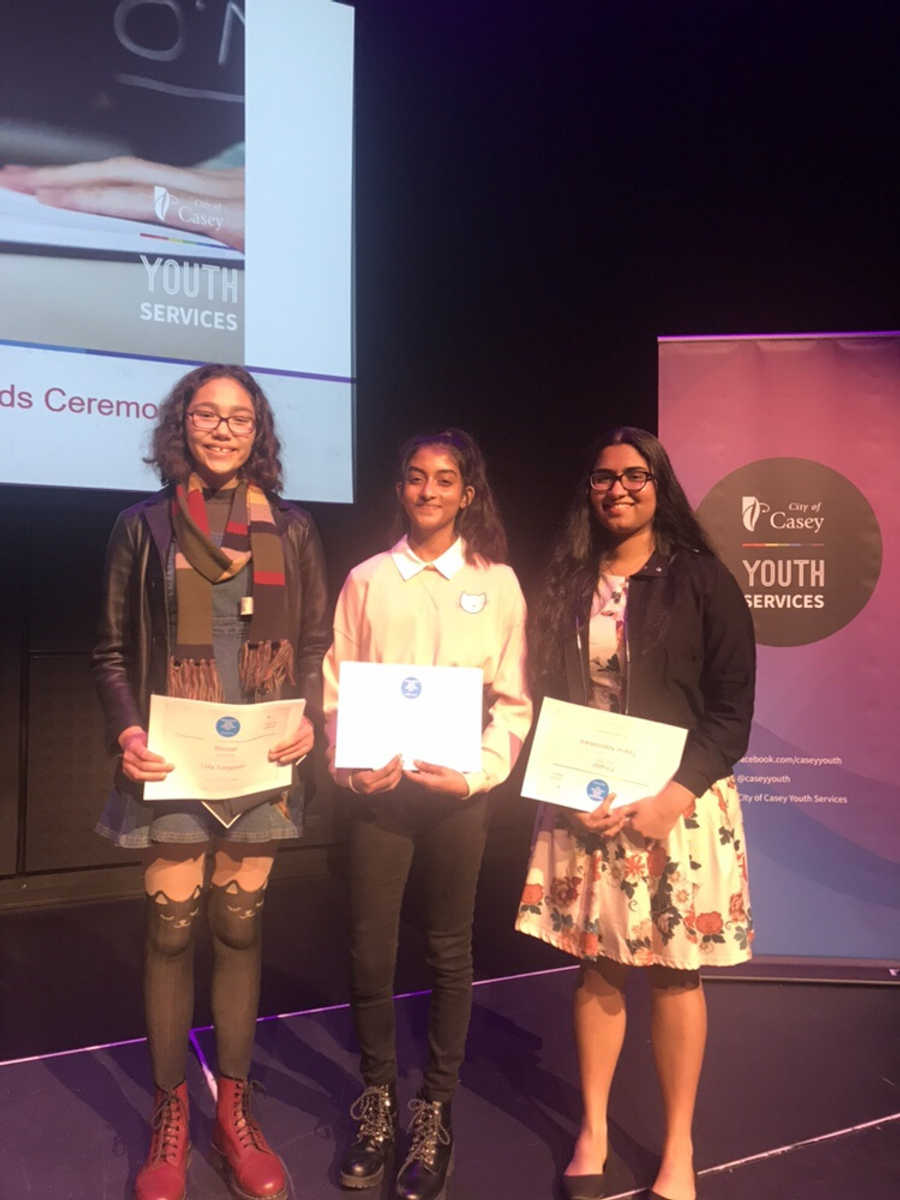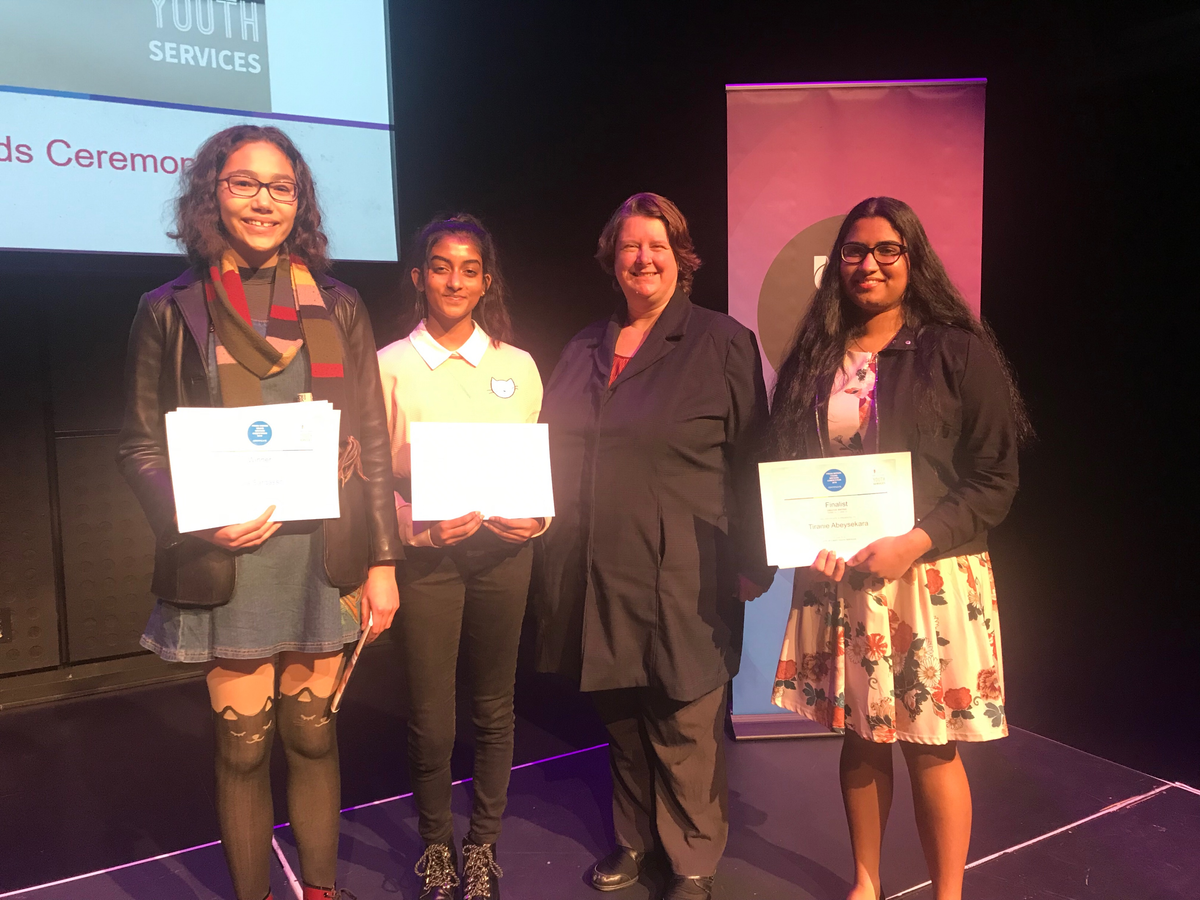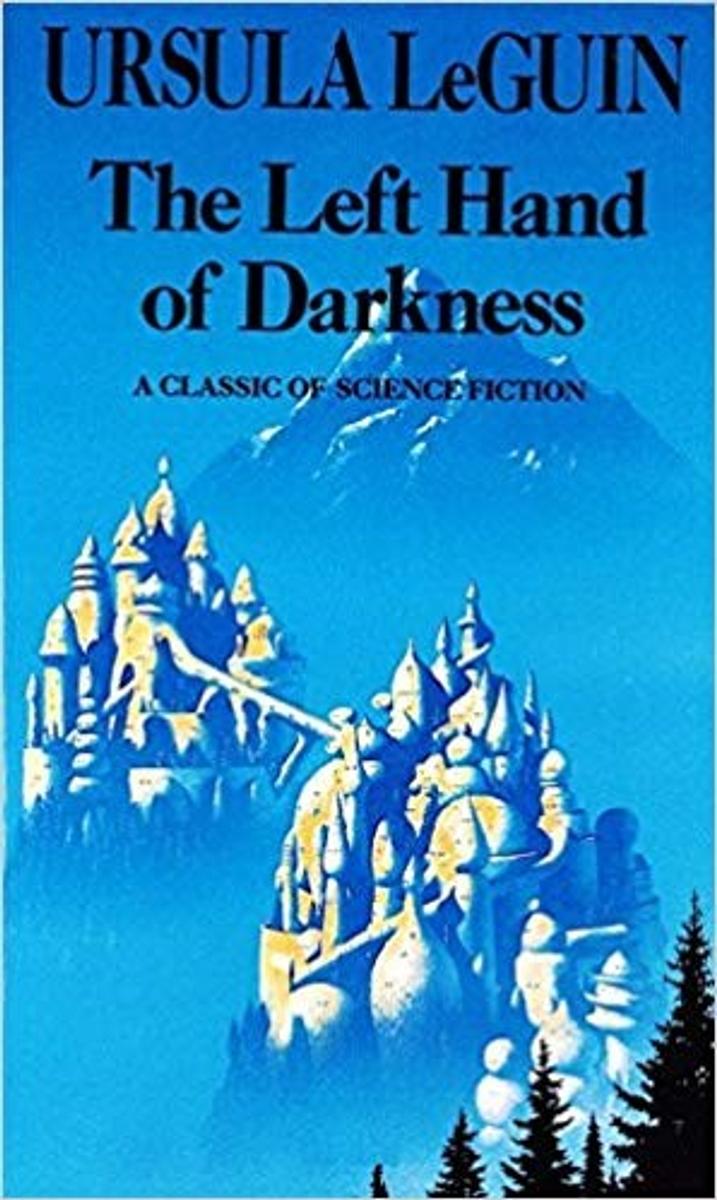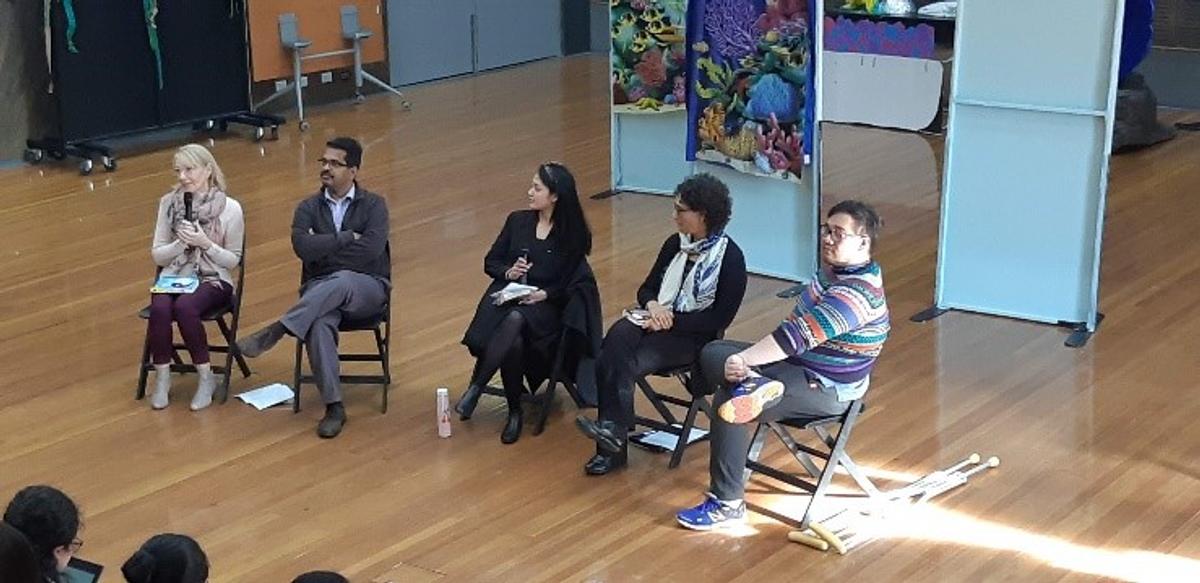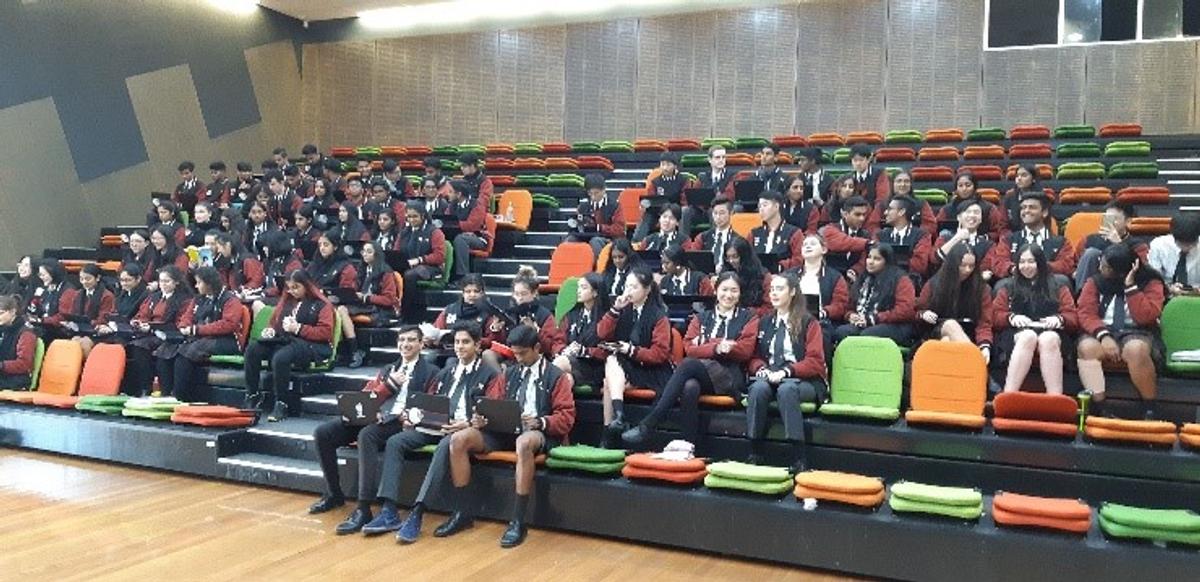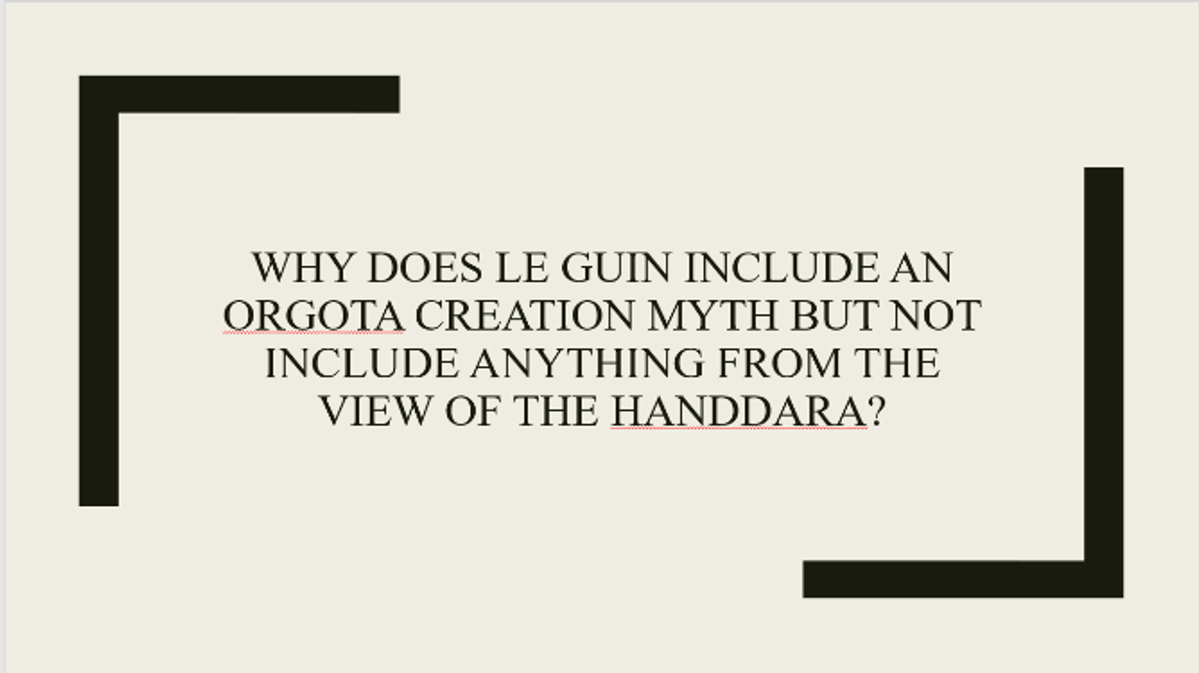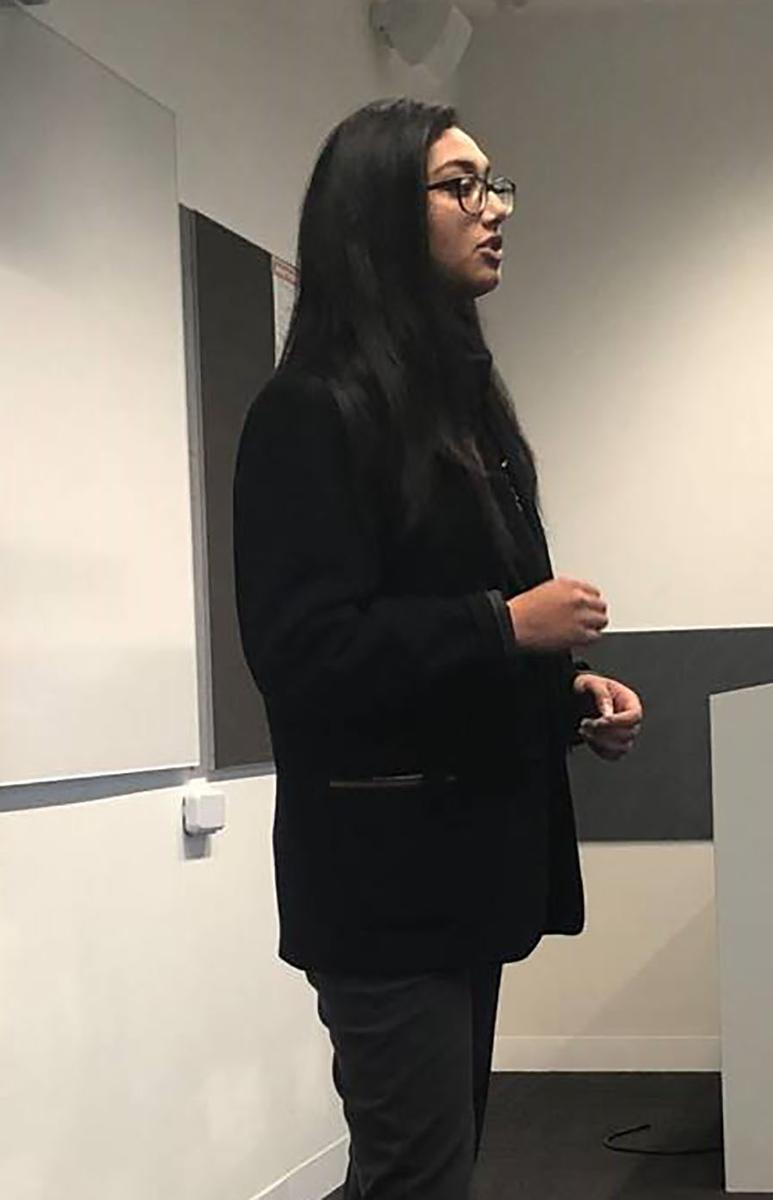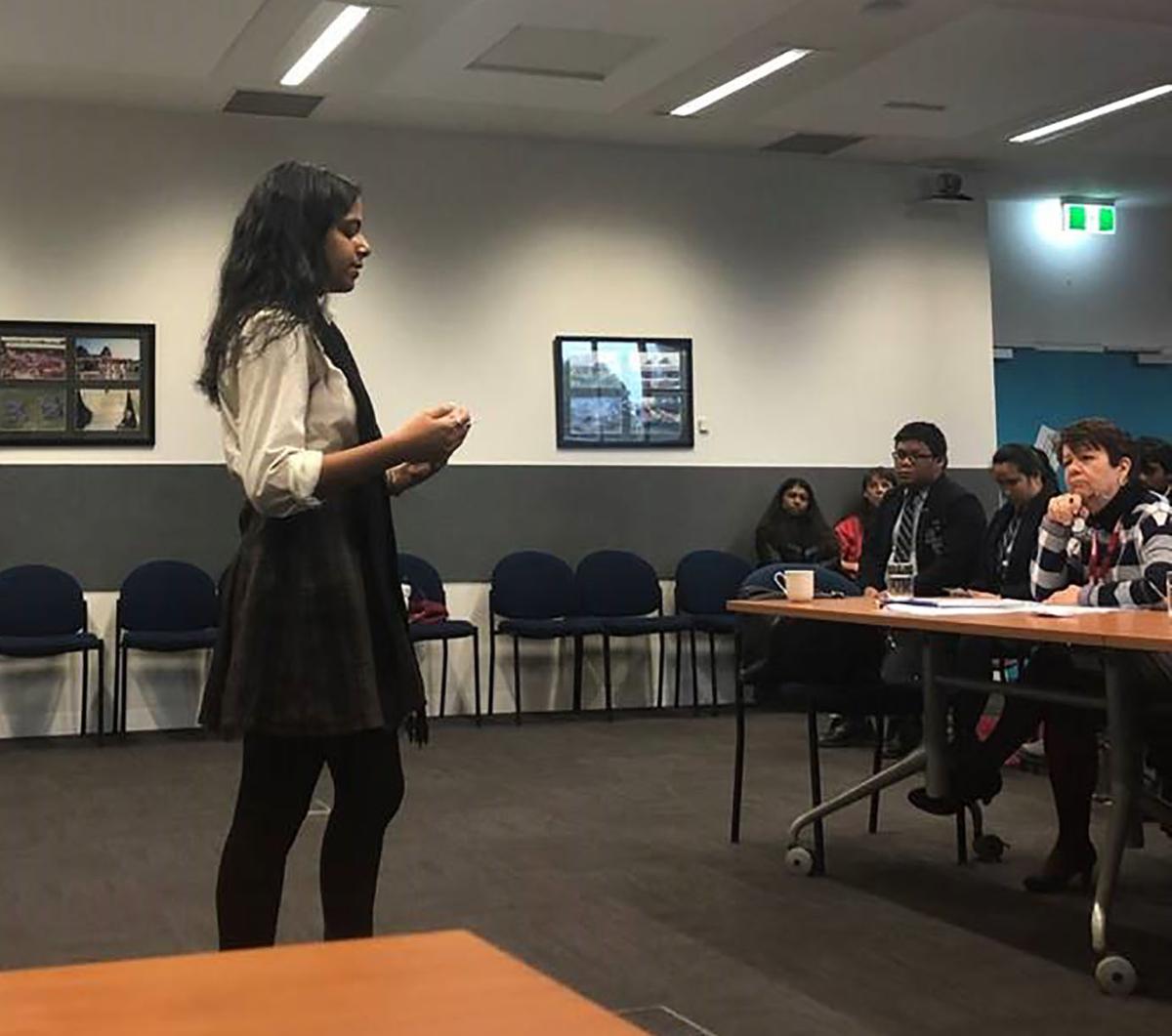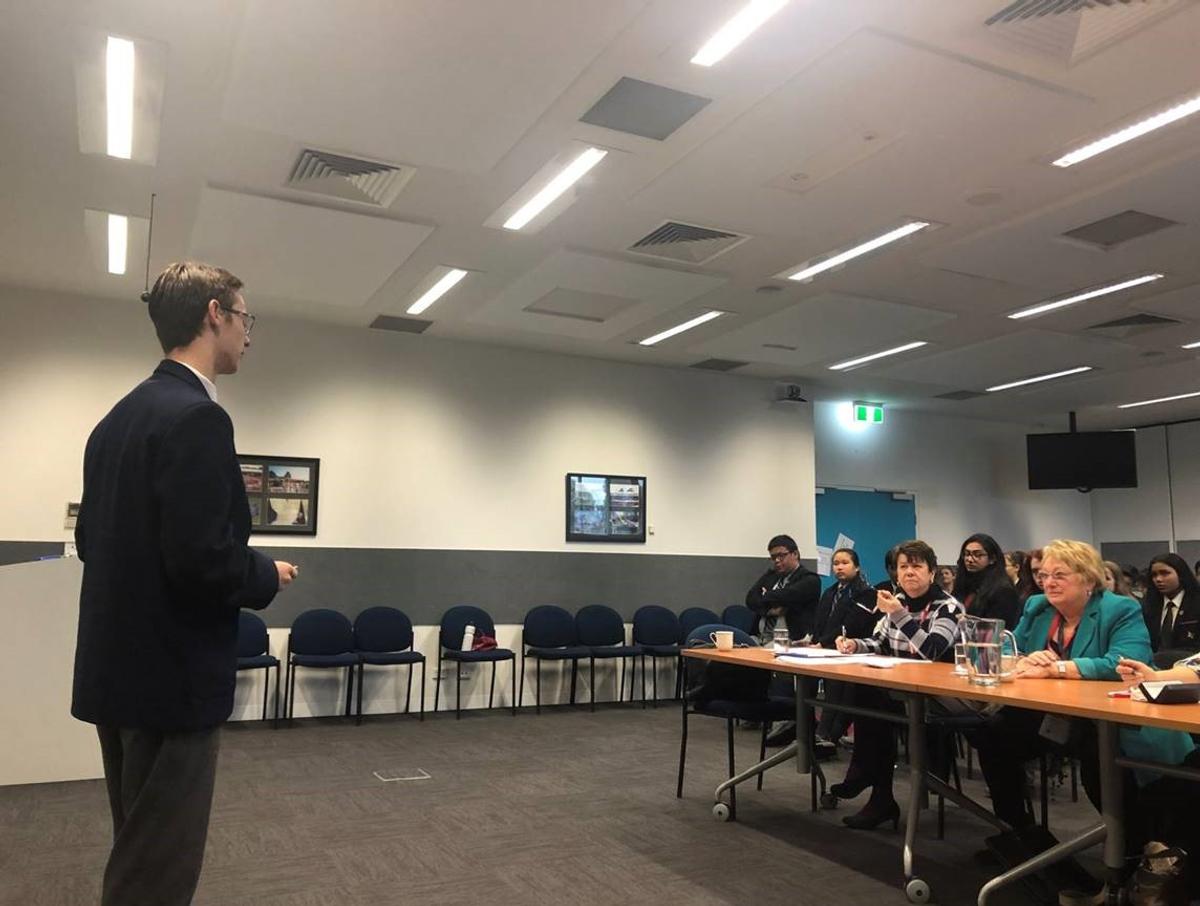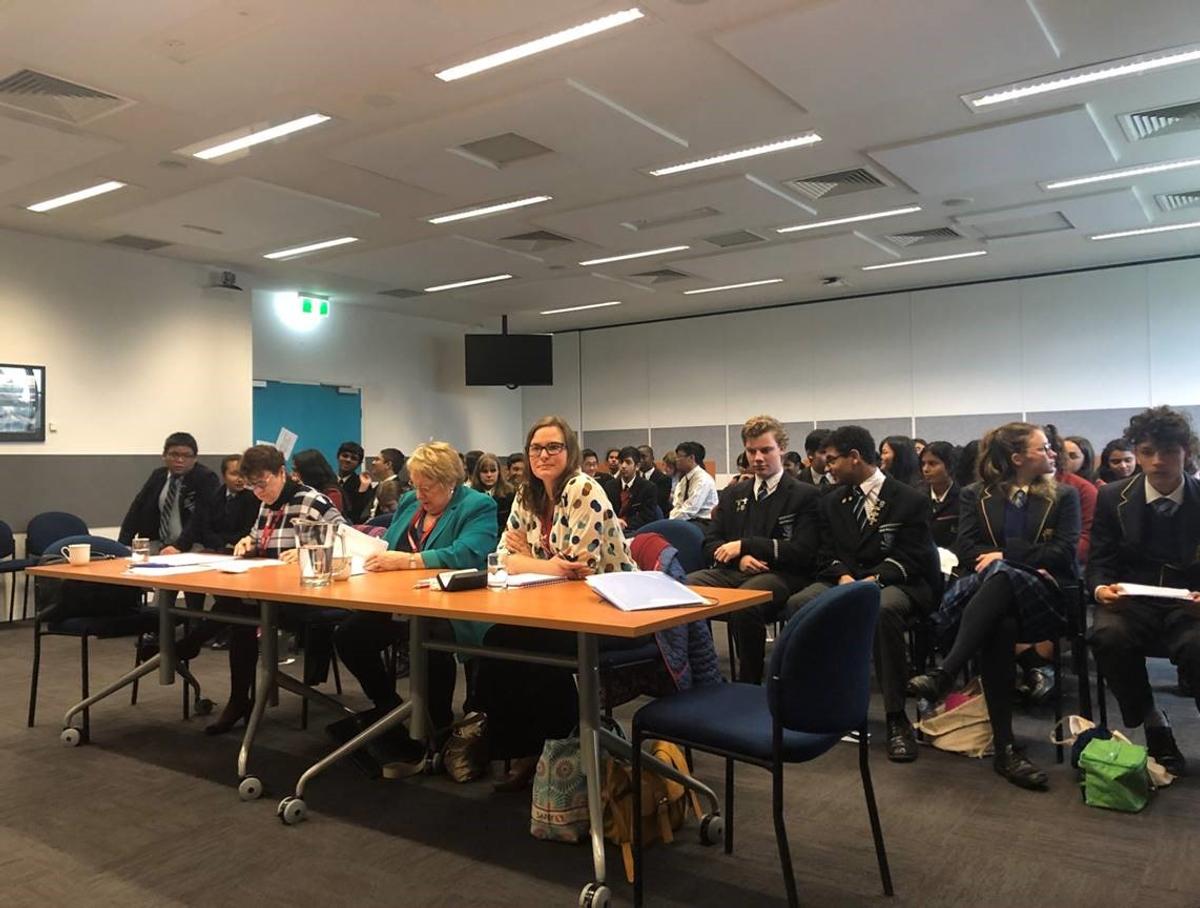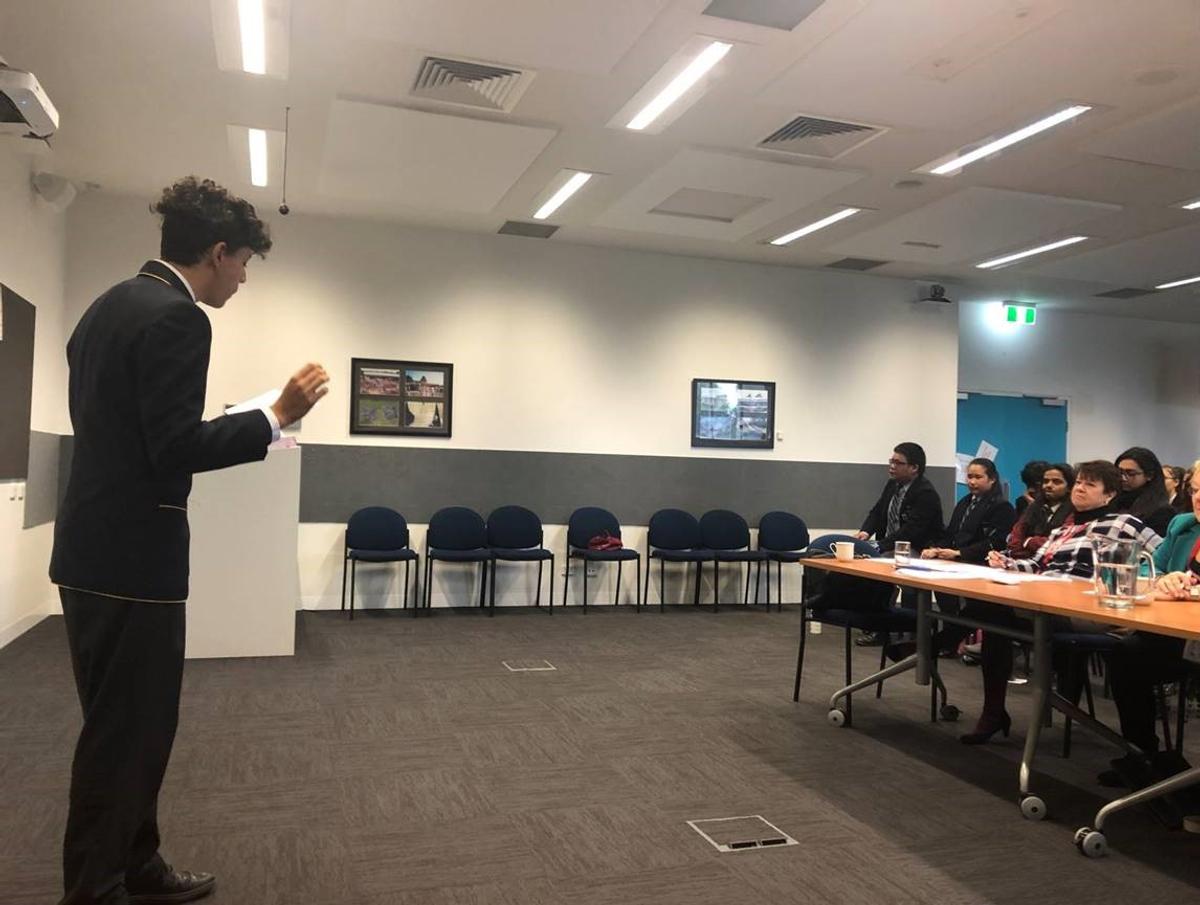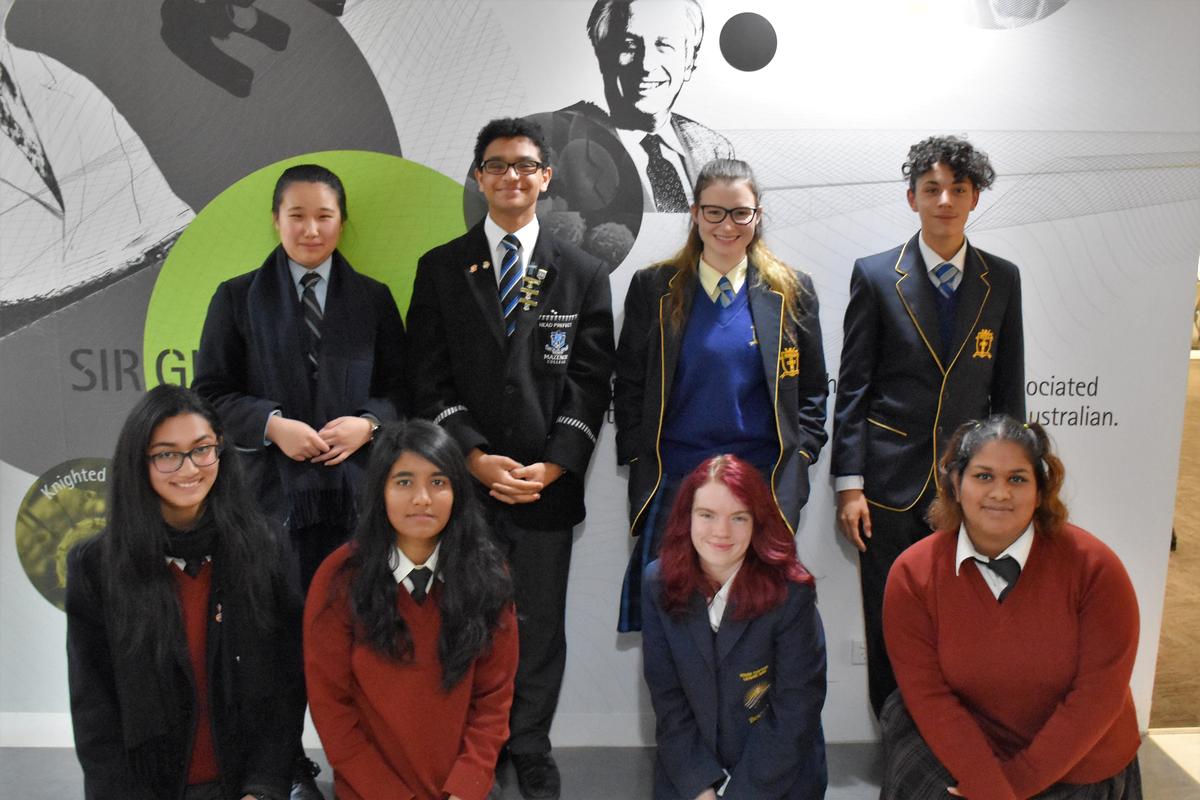English News

Fresh Words Young Writers Competition 2019
On 27 June, I attended the awards ceremony for the Casey Fresh Words Young Writers Competition for 2019. After a few previous attempts, this year I was selected as one of the four finalists for the creative writing Years 10-12 category. Little did I know that I was not alone that night, seeing familiar faces from Nossal at the ceremony. Lola Sargasso was one of the four finalists for creative writing and the poetry and lyrics Years 7-9 category, along with Biruntha Muhunthan who was also selected as a finalist for the poetry and lyrics Year 10-12 category.
We walked in with our families as well as our supportive teachers into what was truly an eventful evening. We experienced an exciting performance from guest speaker, Jude Chrisan. We also heard from renowned three-time New York Times best seller author, Adam Wallace. Throughout the night, some finalists showcased their stories and poems, it was a great experience for me to witness the immense talent I was sitting with. Everyone was very lucky to hear Nossal’s very own Lola read out her beautiful and original creative story, Writing in the Dark.
I would like to thank Ms Banaag, Mr Woon, Ms Mackin and Dr Schroor who came along to support us, we wouldn’t have made it without teachers like them.
Congratulations to both Lola and Biruntha for not only being selected as finalists but also taking home first prize with their amazing poetry and creative writing.
Tiranie Abeysekara
Year 12
Fresh Words Nossal Students' Submissions
Humanity
Every Wednesday after school, while my friends were studying or hanging out, I gave up my time and worked at my local library. Part of my conscience tells me I need to earn some money for my future as I will soon be heading out into the real world in a matter of months and another part of me does it for the experience, but either way I don’t regret why I chose to work part time. However, it was only a week ago while I was organising books onto shelves that I really experienced what the “real world” was about. I saw two young children, complete strangers, in the children’s section. At first they shyly introduced themselves, looking back at their mothers for support, but they were both in desperate need of a friend and so after a few minutes they had become the best of friends. Their connection instantly caught my attention simply because I saw this kind-hearted and pure friendship between two young strangers, both being children of two different races, two different colours. I think back to my childhood, when I first started going to school in Australia, there weren’t many kids like me, literally I was the only brown child. The other kids were not so accepting of me or my background and for many years I felt excluded. Being in year 12, I have only ever developed friendships with people from my culture or similar. But these two kids didn’t see colour or background when they met, they saw another child looking for a friend. They saw another person. Nevertheless, my story isn’t about racial discrimination. These two kids proved me wrong and gave me hope, that people support each other at times of need. I am a proud Sri Lankan-born Australian citizen, and in the after math of the gruesome and barbaric Easter Sunday Bombings, I felt the indecent attack on the Christian community in Sri Lanka, but more importantly the uncalled for attack on humanity. I mourned for the victims of the Christchurch shootings but I didn’t really feel the pain of the attack, loss or hardship until it happened to my family back home. But as the days passed on, people all over the world gathered to support the Sri Lanka, restoring the humanity that was cowardly shot down. The hope I longed for finally became reality when I saw the Buddhist community, Christian community and other religious communities come together. World leaders encouraging peace. People donating whatever they can. To me it was so important to see people forget their gender, race and ethnicities in order to protect each other at a time humankind was threatened. Even being thousands of kilometres away from home, I prayed the next world war wasn’t on the way. I was determined to make sure people would put aside their own agendas to help the families who were enduring unimaginable pain. In the powerful words of Jacinda Arden, “an assault on the freedom of any one of who practices their faith or religion, is not welcome”, absolutely anywhere. Just like the two children who supported each other when they had no one, the world lent a hand to Sri Lanka and showing people can now be hopeful for the future. Even though there will be cowards who would rather kill to prove a point, the power of unity from a countless number of people around the world will always prevail. Malala Yousufzai puts it together plain and simple, “Global peace requires not on the education of the mind but also the heart and the soul”.
Tiranie Abeysekara
Year 12
Writing in the Dark
The poet wakes. A shaft of moonlight falls across her bed and fills her room with eerie light. Sighing softly, she leaves her bed and reaches for her candlestick, but then stops. Midnight is a familiar time to artists, and this particular poet is far from a stranger to it. Her desk waits, empty in the corner save for a single page of parchment lying flat along its wooden surface. Still reaching for a candle, her hand alights upon a quill, and she moves almost without thinking to her table. There is no need of candles when writing in the dark.
The poet is writing, and yet she knows not what she writes. Her quill dances in the moonlight, but what it puts to paper is by some strange magic, not hers at all. She glances upwards and starts, falling back against her chair. The moonbeams fall across her curtains and transform them into bizarre and curious beings with malignant intent. Looked at properly, they return to crushed velvet. Almost crushed velvet. She sits quietly for a second, and then, giving in to sudden compulsion, bends her head forwards and, uneasy, continues in her work.
The poet grows afraid. Her hand quivers whilst she writes, but she must not stop. She cannot stop. Her room is alien in the silent light of the moon, and the ordinary objects that make up her life are gone, changed into unearthly monsters that bring a nervous pallor to her face. They would harm her where she sits, but for one thing. The poem. It is unwritten, and they must wait in the shadows. But they grow impatient. The moon grows brighter. The poem unravels.
The poet nears the end of her verse, and the room is loud with silence. She writes the last fatal word, trembling. Her quill falls from her hand, and she waits. She does not wait long. In the silence, the light looms leisurely, lovingly over her chair. Hopelessly, she glances at her door, and that's when she sees it. A flicker of light under the doorframe. Just a glimpse. But a glimpse is all she needs. With a desperate burst of strength, she rushes from her chair and pushes the door open. A candle, left by her daughter, sits on the bookshelf. A flame. Its ruddy warmth a welcome change to the luminescence to the pale moon. It sparks an idea in her mind. Quickly, blindly, she grabs the candle and thrusts back into her chamber.
The poet peers around her room, and her fears return to the shadows. It is dark. So dark. So blissfully dark. What little light there is, is brought by the candle she holds tight in her hand. She enters her room, and proves herself wrong. An uncanny glow emanates, seemingly without a cause, from the wooden desk in the corner. But there is, most certainly, a cause. On her desk there is a poem, with words that shine across the page. In her mind, there is a war of indecision. She picks up the poem, still clutching her candle, and reads it through. She reads it again, until she feels the words are imprinted on her soul. This poet is not a genius, nor does she claim to be, but this poem outshines anything she has ever seen. A wave of regret passes through her, but she is resigned. Sadly, the poet consigns her ill-gotten masterpiece to the flames. It is gone.
Lola Sargasso
Year 9
Jump
Have you ever just had the urge to jump?
Jump from excitement, when life is going so well and you don’t know how to let out your joy,
Jump when you finally have the answer to a complicated question,
Jump when you finally have the killer response to win that argument you’ve been having for days.
Or rather you want to jump because a spider appeared on the paperwork you’ve been doing all night,
Jump because it’s finally time for your end of year exam results to come out,
Jump because you hear a window breaking downstairs at the dead of night.
Lord knows I would rather have any one of those as the reasons I want to jump today, the good and the bad;
And yet I find myself standing here, fifty feet above the ground, not knowing exactly why…
Biruntha Muhunthan
Year 10
Mulling on a Summer Week Spent at School
Some
Left Hand of Darkness Panel
Ursula Le Guin’s Left Hand of Darkness is the Year 12 analytical interpretation text for 2019, an enchanting science fiction novel that explores politics, empathy and the power of storytelling set on the alien planet Gethen. The Year 12 English faculty and students gathered together on 14 June to conduct our first ‘Left Hand of Darkness Panel’ – a discussion of various aspects of the text, centred around questions submitted by the students and collated by the English leaders.
Despite our initial concerns of not having enough, we entered the session with over 30 questions, however, we were only able to get through five, which is a demonstration of the nuances within Le Guin’s novel and the teachers’ love for the same. Having five English teachers dissect the themes and concerns of a novel was quite interesting and provided us with perspectives we may not be exposed to in class. The disagreements and interpretations of a singular event speaks to the depth and multiplicity of reading and studying a novel, which was celebrated on the day.
The students have provided overwhelmingly positive feedback regarding the panel and have requested that it be conducted more often, and for all the texts we study. The imminent SAC turned the focus of a lot of questions towards essays and technical aspects and conducting one of these earlier in out text study promises several benefits. Though our in-class discussions are insightful and engaging, the opportunity to have different opinions on student directed aspects of our novels will greatly aid out study and overall engagement with the text.
Nanditha Hareesh
Year 12 English Leader
Plain English Speaking Award’s State Final Competition
On Friday 22 July, Martin Duong, Andrea Thaitong, Mr Page and I met Nalini Jacob-Roussety at the State Library of Victoria’s Village Roadshow Theatre to support her in the Plain English Speaking Award’s State Final Competition.
Whilst Nalini was whisked away to prepare for the day of oration, we enjoyed a ‘behind the scenes’ tour of the State Library. It was a rare opportunity to view some of the artwork and texts that the State Library Houses (a cool five million in its total collection), as well as to see the State Library before it opened to the public for the day. After the tour, the finals began with a warm welcome to country from Indigenous Elder Uncle Perry Wandin, who also expressed his admiration for all of the young people competing in the finals.
Nalini was the first speaker for both the prepared and impromptu sections of the competition. She delivered her prepared speech ‘Existing as a statistic’ from memory and fully engaged the audience through her oration skills. Nalini discussed the positive impact that we can all have to transform the lives of those less fortunate than ourselves and used many emotive examples to illustrate her case.
After the prepared speeches of the other five finalists, which discussed a wide range of topics, Nalini was given her allotted four minutes to prepare her response to the impromptu topic ‘History in the making’. Nalini spoke about the effects of climbing Uluru before the ban is in effect and how land should be returned to Indigenous Australians.
Unfortunately, Nalini did not place as the winner or the runner up. However, she spoke with extreme precision and coolness under pressure, and presented two very thought-provoking speeches. The entire Nossal community is extremely proud of you, Nalini, for your significant achievements through the PESA program. Well done!
Emma Winton
PESA Coordinator
Photos taken from preliminary heats of PESA held at Nossal.

